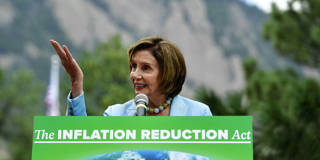As the United States and Europe pursue climate action and domestic economic goals, developing countries fear that the breakdown of the multilateral trade system will undermine their development prospects. While these concerns are not groundless, poorer countries can and must shape their own trajectories.
CAMBRIDGE – Developing countries are increasingly worried that the United States will turn its back on the multilateral trade regime. Amid rising geopolitical tensions, policymakers in lower- and middle-income countries fear that a breakdown of that regime could make them hostages to great-power politics, undermining their economic prospects.
Their concerns are not groundless: US trade policies have changed significantly over the past few years. What seemed like a series of haphazard measures under former President Donald Trump – sanctions on Chinese firms, increased tariffs, and the fatal subversion of the World Trade Organization’s dispute-settlement body – has become a broad, coherent strategy under current President Joe Biden.
This strategy, which aims to reconstitute America’s role in the global economy, embodies two imperatives. First, the US now regards China as its main geopolitical rival and views its technological ascendance as a national-security threat. As the administration’s sweeping restrictions on the sale of advanced chips and chip-making equipment to Chinese firms show, the US is willing to sacrifice international trade and investment to thwart China’s ambitions. Moreover, it expects other countries to do the same.

CAMBRIDGE – Developing countries are increasingly worried that the United States will turn its back on the multilateral trade regime. Amid rising geopolitical tensions, policymakers in lower- and middle-income countries fear that a breakdown of that regime could make them hostages to great-power politics, undermining their economic prospects.
Their concerns are not groundless: US trade policies have changed significantly over the past few years. What seemed like a series of haphazard measures under former President Donald Trump – sanctions on Chinese firms, increased tariffs, and the fatal subversion of the World Trade Organization’s dispute-settlement body – has become a broad, coherent strategy under current President Joe Biden.
This strategy, which aims to reconstitute America’s role in the global economy, embodies two imperatives. First, the US now regards China as its main geopolitical rival and views its technological ascendance as a national-security threat. As the administration’s sweeping restrictions on the sale of advanced chips and chip-making equipment to Chinese firms show, the US is willing to sacrifice international trade and investment to thwart China’s ambitions. Moreover, it expects other countries to do the same.